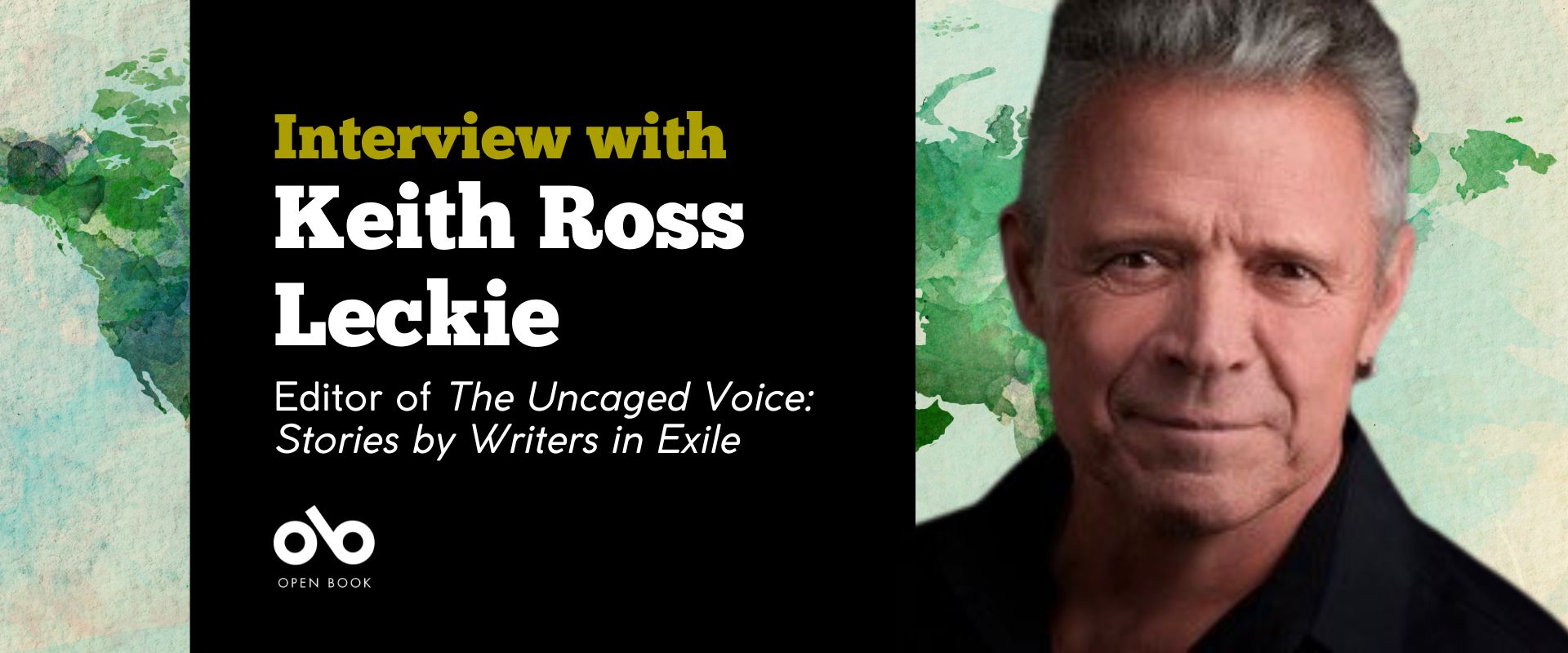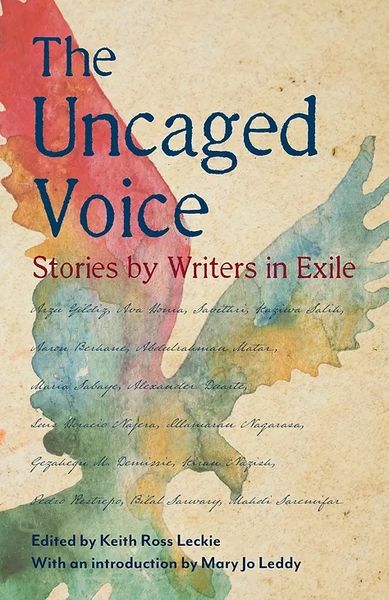Keith Ross Leckie on Celebrating the Power & Courage of Writers in Exile in The Uncaged Voice
A press and publishing industry free from government censorship is something we hold sacred in Canada and consider inviolable. Yet writers around the world risk persecution, imprisonment, and violence for putting pen to paper – something Keith Ross Leckie knows well from his long-standing relationships with numerous refugee writers who began to rebuild their lives in Canada.
Leckie and his fellow writer Mary Jo Leddy created the Exile Supper Club, a group which brought together writers in exile and Canadian writers for support, encouragement, feedback, and community. As they shared their stories, Leckie saw the importance of their tales and beauty of their prose, and decided to find a way to celebrate their work.
The result is The Uncaged Voice: Stories by Writers in Exile (Cormorant Books), edited and introduced by Leckie and Leddy and containing works by 15 writers from 14 countries, sharing their long and courageous paths.
Incorporating both narrative nonfiction and short fiction, The Uncaged Voice is an urgent reminder that telling a story is not a neutral or safe act – that for many, it is an undertaking of supreme bravery. War correspondents, women journalists, newspaper editors, and more fill the pages with resilience and resistance. The contributors are Aaron Berhane, Gezahegn Mekonnen Demissie, Alexander Duarte, Ava Homa, Abdulrahman Matar, Ilamaran Nagarasa, Luis Horacio Nájera, Kiran Nazish, Pedro A. Restrepo, Maria Saba, Kaziwa Salih, Mahdi Saremifar, Bilal Sarwary, Savithri, and Arzu Yildiz.
We're speaking with Leckie today about how The Uncaged Voice came together and why it was essential to publish. He tells us about the genius of the Exile Supper Club, his time as a journalist in Pakistan, Afghanistan, and Central America, and his hope that the collection will draw attention to the issue of "governments all over the world are feeling more and more free to manipulate the truth", including those closer to home.
Open Book:
Tell us about the new book and how you became involved with it.
Keith Ross Leckie:
Some years ago through Romero House, a refugee shelter consisting of four houses in Toronto’s West side run by Mary Jo Leddy, we began a casual monthly Writers in Exile Supper Club. There were refugee writers, who had fled their oppressive countries, and local writers like myself. We shared food and wine and stories. Two years ago, we decided an anthology of these stories might be interesting with the common theme of the worsening oppression in the world of journalists and the truth. The original idea was for 10 writers (senior journalists) from 10 different countries to tell their story.
I gathered together the pieces and took them to our agent Sam Hiyate with a presentation. He loved it and took it to publishing houses. The most enthusiastic response came from Marc Cote at Cormorant Books. The Uncaged Voice became 15 writers from 14 countries, 9 men and 6 women who had been driven from their countries for writing the truth. The stories are heartrending. One escapes across the border under a hail of bullets, one escapes after 8 years of torture and imprisonment, one has her children taken away by the state for what she wrote. As a privledged white Canadian-born writer I wanted to help in any way to have these stories told.
OB:
What drew you, personally, to this subject matter, and why was this the right time to gather pieces in book form?
Your CanLit News
Subscribe to Open Book’s newsletter to get local book events, literary content, writing tips, and more in your inbox
KRL:
As a former journalist who had worked briefly in Pakistan and Afghanistan and in Central America, I felt a kinship to these writers. One of the Romero Houses is across the street from me and I see the waves of refugees who come through over the last 30 years. One of the most crucial elements of any democracy is knowing the truth and I have seen the idea of “fake news” and “alternatie truths” and “conspiracy theories” undermine what is real, first under Trump and it is now spreading to be used by all the authoritarian governments around the world. The stories in The Uncaged Voice should make us very concerned.
OB:
How did you select the pieces for this book? What were you looking for when assembling it?
KRL:
Through the Writers in Exile group, the stories came together quite organically. I wanted variety of style and story, I wanted a wide selection of oppressive countries represented and a good balance of men and women writers, and we got it. Some of the stories needed translation and editing. We immediately had three editing volunteers to help with the submissions. We easily put together ten writers and as the book gained momentum, five more came to me before we had to cap the numbers. Since then we have received enough for another anthology! There was a very comprehensive, very sensitive final edit done by Cormorant to prepare for publication.
OB:
How do you view the pieces in the book as speaking to each other?
KRL:
Each of the pieces in the anthology represent suppression of the truth. It can be as horrific as imprisonment and torture for telling the truth or as seemingly benign as censoring/changing scientific fact if it doesn’t suit those in power.
OB:
What do you hope readers will take away from these pieces, after having read them all? Is there a question you set out to address or delve into through these works?
KRL:
I think there is great entertainment value in the stories as they are but that aside, I hope the anthology will sound an alarm that authoritarian governments all over the world are feeling more and more free to manipulate the truth for their own ends and silence those who oppose this. And this is happening even in our own democratic countries and we have to stay vigilante that unrestricted social media does not replace honest, accountable journalism.
OB:
Did you get to work with any writers you already knew for this project? Tell us a bit about those pieces and how you worked with the writers you knew prior to this book?
KRL:
As a neighbourhood member of the Writer’s in Exile Supper Club at Romero House, I got to know many of these writers in a social environment speaking of landed immigrant status, finding jobs, other trials and challenges, hopes and dreams, but as I received their submissions I realized the terrible things they had been through, the courage they had shown. Often their experiences were very difficult for them to relive and talk about. I found the pieces revealed things in print they could not speak about in person. I was humbled and so appreciative of the experiences they shared for the book. Arzu, Aaron, Abdulrahman, Savithri, Gezhegn, Bilal, Maran and the other fine writers dug deep into their emotions to give us their truth. I am both proud and humbled by my association with these writers.
OB:
How do you view the role of an editor in relation to an anthology or collection?
KRL:
I was part of a volunteer team of four editors and I think our job was to encourage the writers and help the pieces tell the stories in a clear language that fully realizes their ideas and their individual voices. Remember most were senior, experienced writers in their own countries. They know how to write. Other than helping with their English in some passages, it’s wise to just stand back and let them express themselves.
OB:
What are you working on next?
KRL:
As for my own work, I have a couple of film and television projects in development and have just finished a novel set in Afghanistan leading up to the chaotic US withdrawal. I was a young journalist there reporting on the Soviet invasion in 1980 and directed a film crew embedded with the Canadian forces in 2007. The book, “The Good American”, is an action adventure but, inspired by Graham Greene’s “The Quiet American” my novel is a strong condemnation of US foreign policy and warfare in that unwinnable war.
_________________________________________________________
Keith Ross Leckie is a scriptwriter and novelist with credits for many movies and mini-series for Canadian and American television. His novels include the best-selling Coppermine and Cursed! Blood of the Donnellys, both of which are being adapted for screen. Leckie has been a member of the Writers in Exile group of PEN Canada and worked with the Romero House refugee centre for many years. He lives in in Toronto, Ontario.





